What makes happy people happy? Why is someone who goes through a tragedy or lives in a horrible situation happy, while others who seem to have it all are miserable?
Darcy Steinke shares why she believes pain shapes not only the body, but the soul.
Mimi Nichter invites us to reflect not only on trauma, but on the resilience required to survive it and the ways the past continues to shape who we are today.
Nicolas Darveau-Garneau talks about what the top 5 percent of companies do differently, how leaders can avoid the hidden traps that limit growth, and what it really takes to build organizations designed to thrive in the age of AI.
Julie Menanno talks about what secure love really is, how it’s built over time, and the small but powerful shifts that help couples move from surviving conflict to feeling truly secure together.
The number of people working from home, coupled with technology that offers immediate communication, is creating a dangerous work environment in which people are expected to be available 24 hours a day, seven days a week.
Social distancing does not have to mean socially disconnecting. Before coronavirus concerns, one in four older adults were affected by social isolation.
During these challenging times, retail chains, food delivery services, home improvement brands, and pharmacies are all hiring tens of thousands of workers.
Threats exist beyond the disease itself and criminals will use the situation to take advantage of you! Here are a few ways to help you stay safe online.

















